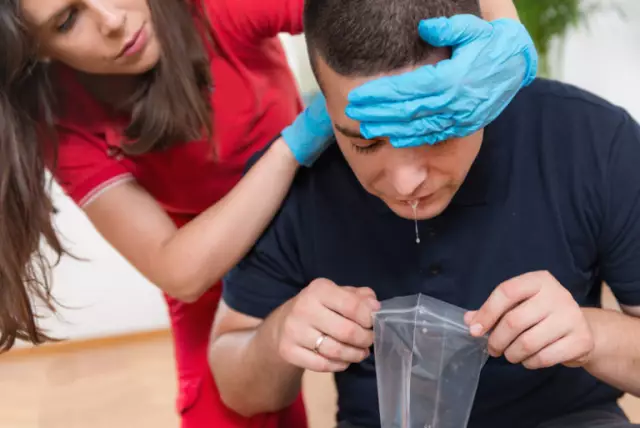- Author Rachel Wainwright wainwright@abchealthonline.com.
- Public 2023-12-15 07:39.
- Last modified 2025-11-02 20:14.
Avocado poisoning
Avocado poisoning is not uncommon, today we will take a closer look at this issue.
The avocado tree is very fast growing - in a short time it can grow up to 20 meters in height. The leaves are large, elliptical and fall off throughout the year. The flowers are bisexual, small and inconspicuous, greenish in color. The avocado fruit is a single-seeded spherical, ellipsoidal or pear-shaped berry, the weight can reach two kilograms. The skin is tough. Unripe fruits are green, after full ripening the peel turns black. The pulp of ripe fruits is yellow-green or yellow, oily, due to the high content of vegetable fats. A large seed is located in the center of the berry.

Source: depositphotos.com
Due to the high content of vitamins, trace elements and polyunsaturated fatty acids, avocados are very useful. Regular consumption of it in food helps to improve memory, reduces the risk of cardiovascular diseases, including atherosclerosis.
However, in some cases, avocados can cause food poisoning.
How does avocado poisoning happen?
The leaves, stone, peel and pulp of unripe avocado fruits contain persin, a substance belonging to the class of fungicidal toxins. It is very dangerous for animals, but in humans it can also cause food poisoning or severe allergic reactions.
Avocado also contains a carbohydrate substance - mannoheptulose. It has the ability to inhibit the synthesis of insulin by cells of the pancreas, and also reduces the concentration of this hormone in the blood serum. Long-term use of avocados in food, and even in large quantities, contributes to the development of hyperglycemia, which is especially dangerous for patients with diabetes.
Symptoms
For food poisoning, avocados are characterized by:
- nausea;
- vomiting;
- flatulence;
- diarrhea;
- stomach ache.
Allergic reactions associated with eating avocados can include hives, sore throat, and severe coughing fits.
Signs of a hyperglycemic condition due to avocado abuse are:
- intense thirst;
- weakness;
- dry mouth;
- headache;
- itchy skin.
If the blood glucose level is too high, the patient may fall into a coma.

Source: depositphotos.com
First aid for avocado poisoning
First aid for avocado poisoning, proceeding as a food poisoning infection, begins with gastric lavage. The victim is given a few glasses of a light pink solution of potassium permanganate or warm water to drink, then they induce a gag reflex, irritating the root of the tongue. This procedure should be performed several times, until the particles of the eaten food are no longer detected in the vomit.
After that, the patient must be given Activated Carbon, Smecta or any other medicinal preparation with a sorbing effect. This prevents further absorption of toxic substances from the gastrointestinal tract and reduces the severity of intoxication.
In case of allergic reactions, you should take an antihistamine tablet (Zodak, Tavegil, Suprastin, Ketotifen). In the case of a strong allergic reaction, the use of sorption drugs (Smecta, Polysorb, Filtrum STI) and saline laxatives (Magnesium sulfate) is justified. It should be borne in mind that sorbents are taken separately from all other drugs (with an interval of 1-2 hours).
With hyperglycemia, the patient should be provided with plenty of drink.
When is medical attention needed?
Avocado food poisoning is usually mild and people do not see a doctor. But if such poisoning occurs in a child or his symptoms persist for more than two days, medical intervention is necessary.
Qualified help in this case consists in conducting detoxification therapy, prescribing enzyme preparations, and, if necessary, antibacterial agents.
In case of a severe allergic reaction, when the patient has difficulty breathing, swelling of the face and neck, it is necessary to urgently call an ambulance. In this case, treatment is carried out in the department of allergology, corticosteroid hormones, antihistamines and calcium preparations are prescribed.
If signs of hyperglycemia appear, the patient should be admitted to the endocrinology department. Treatment consists in correcting water-salt imbalance and acidosis, and administering insulin.
Possible consequences
All types of avocado poisoning pass without any consequences for the body. It may take several days to recover, during which you should follow a diet that limits the use of heavy foods, thermally unprocessed vegetables and fruits.
Prevention
Prevention of avocado poisoning is simple:
- do not eat unripe pulp;
- do not eat the skin and bones.
For people with diabetes, it is important to limit the amount of avocados in their diet.
YouTube video related to the article:

Elena Minkina Doctor anesthesiologist-resuscitator About the author
Education: graduated from the Tashkent State Medical Institute, specializing in general medicine in 1991. Repeatedly passed refresher courses.
Work experience: anesthesiologist-resuscitator of the city maternity complex, resuscitator of the hemodialysis department.
The information is generalized and provided for informational purposes only. At the first sign of illness, see your doctor. Self-medication is hazardous to health!






